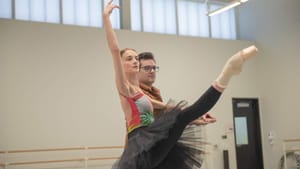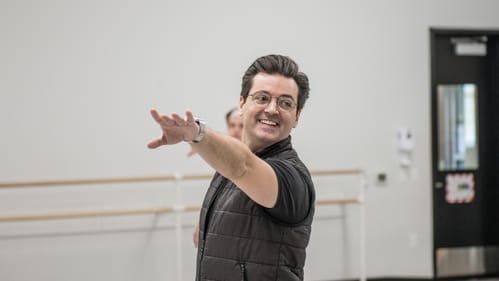Stay in the Loop
BSR publishes on a weekly schedule, with an email newsletter every Wednesday and Thursday morning. There’s no paywall, and subscribing is always free.
Building an international company
Will the Pennsylvania Ballet ever hit the world stage?

Ever since acclaimed Spanish danseur Angel Corella took the artistic-director helm at the Pennsylvania Ballet, the company has touted itself as an international one. Corella, who became a U.S. citizen in February 2019, hails from the outskirts of Madrid. His stellar career has taken him all over the world, which certainly gives the company international cachet. Ultimately, however, a company cannot claim it is internationally ranked until a global audience has the opportunity to see it in action and make that judgment.
Here’s the burning question: “How can you say you are internationally ranked when you only dance regionally?” When I ask, I expect an argument. Instead, Corella says, “I agree 100 percent.” Executive director Shelly Power nods emphatically. “You’re right.”
At home and abroad
An international reputation elevates a company in the eyes of its hometown and can make that town a cultural destination for arts tourism, attracting new ticket buyers and donors. According to Power, touring the company was a gleam in board chairman David Hoffman’s eye from the moment he brought Corella to Philadelphia. “He probably already sees us there,” she says with a gleam of her own. It is part of the company’s strategic plan.
Corella recognizes the steps to that goal: “First is to have international dancers, then is to have the international repertoire, which we do now. Touring internationally, that’s hopefully the next step.”
Philadelphia audiences have seen the first two parts of the plan come together right here at home. After a rocky first few years under the new artistic director, the company is now as sharp as it has ever been, with dancers' homes ranging from New Jersey to China and commissioned works from the likes of Finnish choreographer Jorma Elo, as well as an able focus on the classics and Balanchine. Corella says he’s heard from a number of international sources that would like to see the company in their countries — “There is so much buzz.”
Yet, five years into Corella’s tenure, we are still waiting for our own Pennsylvania Ballet to shine on the world stage.
The price of progress
Corella almost left out one vital caveat to his three-step plan. “You have to be seen internationally, but without going into a hole,” he adds. In the past, that hole has been pretty deep. The company has survived rocky financial times, and touring any company of its scale is expensive. To take a production like Swan Lake to China, for example, would cost upward of a quarter-million dollars. I think that sounds low, but Powers gives credit to Corella, who keeps an eye on the bottom line.

The word frugal certainly came up, but nothing in the arts happens in a financial vacuum. Dancers are normally furloughed during the off-season. For a tour, the company must pay them for the additional performance and rehearsal time and cover their travel and living expenses. Sets and costumes must sail halfway around the world by shipping container, and music and all the meticulous details that go into putting a performance on the stage — including the stage and the theater it sits in — come with a price tag.
Teaming for growth
That's where Shelly Power comes in. As executive director, she finds the money to fulfill the company’s dreams while looking out for its fiscal future. (The term financial wellbeing came up a lot in our conversation, too — everyone seems acutely aware of how precariously close to disaster the company has danced in the past.)
With an annual budget of $15 million, another quarter-million seems like a small amount to raise, but the company has already committed to an expensive, long-term project in building a home north of City Hall. And when Power arrived in Philadelphia a year ago, the dearth of development staffers was dire.
“It’s virtually impossible to grow an organization [of this size] with four people in development,” Powers says, and offers her own to-do list: “The first step is to invest in your development department. Give them the people and the bandwidth to get out there and do their jobs with new donors, new relationships, new corporations, new investment partners.”

Over the past year, Power has doubled the development staff. She's now ready to tackle the next step: new relationships. Increasingly, corporate donors are looking for a two-way street as investment partners, looking for ways to leverage their support of the arts to benefit their own organizations. For example, Power says, a Philadelphia corporation with offices in China may want to contribute to performances in its host country to reflect its corporate home in a prestigious light. An airline might want to participate with points or ticket support for public relations or advertising benefits.
Not yet
Although Corella and Power agree that the company must tour internationally, they spent much of our discussion explaining why they were not touring yet. However, they have made some concrete moves in the right direction. Currently, the company is working with an agent to find presenters who would, as much as possible, fully fund performances in larger international venues. Those arrangements are hard to come by, however, and ticket sales generally cover considerably less than the price of a performance, so the company is also exploring funding options with new investment partnerships. Funding partners can also open up new possibilities, such as international dance festivals.
In the meantime, one of the most dynamic ballet danseurs of our time has had to learn to tap dance (financially, at least) as he manages expectations on all sides — maintaining excitement about the company without soliciting invitations it is not yet prepared to accept. But I could not help noticing one word that came up repeatedly when the subject of actually touring came arose: China may or may not be the first stop on an international tour, but it’s most assuredly on everybody’s mind.
Sign up for our newsletter
All of the week's new articles, all in one place. Sign up for the free weekly BSR newsletters, and don't miss a conversation.

 Camille Bacon-Smith
Camille Bacon-Smith